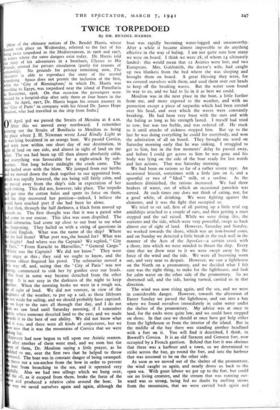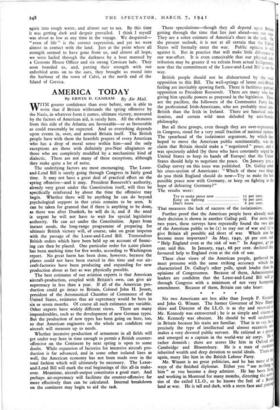TWICE TORPEDOED
By DR. RENDEL HARRIS
[Most of the obituary notices of Dr. Rendel Harris, whose uneral took place on Wednesday, referred to the fact of his ing Mice torpedoed in the Mediterranean, in 1916 and 1917, waters where the same dangers exist today. Dr. Harris told the story of his adventures in a brochure, Ulysses to His riends, printed for private circulation (partly for reasons of ensorship). No grounds for privacy remaining now, The Spectator is able to reproduce the story of the second orpedoing. Space does not permit the inclusion of the first, -hen the 'City of Birmingham,' in which Dr. Harris was ravelling to Egypt, was torpedoed near the island of Pantellaria November, 1916. On that occasion the passengers were escued by a hospital-ship after only three or four hours in the ts. In April, 1917, Dr. Harris began his return journey in e 'City of Paris' in company with his friend Dr. James Hope oulton, who had travelled in the ship from India.] N April 3rd we passed the Straits of Messina at 8 a.m. After this we moved away northward. I remember lining out the Straits of Bonifacio to Moulton as being e place where J. H. Newman wrote Lead Kindly Light as e was lying becalmed in an orange boat. We passed Corsica, d were now within one short day of our destination, in ht of land on one side, and almost in sight of land on the ther. The sea had been up till then almost absolutely calm, d everything was favourable for a night-attack by sub- ines. Not long before midnight the crash came. The *p heeled over with the blow. We jumped from our berths d we moved down the deck together to our appointed boat, Inch was rapidly lowered, the sea being still fairly calm, and e moved away from the ship's side in expectation of her pid sinking. This did not, however, take place. The torpedo ad got into the cotton bales and spent its force on them, d the ship recovered her position—indeed, I believe she ould have reached port if she had been let alone.
Just then, through the half darkness, a black form moved up wards us. The first thought was that it was a patrol who d come to our rescue. This idea was soon dispelled. The• ad submarine had come up close to our boat to see what 3 happening. They hailed us with a string of questions in cailent English. What was the name of the ship? Where 'd she hail from? What port was.she bound for? What was freight? And where was the Captain? We replied, " City Paris," "From Karachi to Marseilles," "General Cargo." \\ here was the Captain? We did not know." They were ry angry at this ; they said we ought to know, and the erman officer fingered his pistol. The submarine moved a e way off, and, seeing that the 'City of Paris' was not ng, commenced to sink her by gunfire over our heads. Our boat in some way became detached from the other oup. It is not easy in the darkness of the night to keep ether. When the morning broke we were in a rough sea, t of sight of land. We did not venture, in view of the ugliness of the weather, to put up a sail, as these lifeboats not made for sailing, and we should probably have capsized. we kept to the oars all through that day, and I do not 'Ilk we saw land until Saturday morning, if I remember htly. when someone descried land to the east, and we made ards it to the best of our ability. We did not know what it was, and there were all kinds of conjectures, but we now that it was the mountains of Corsica that we were for.
Fzposure had now begun to tell upon our Asiatic seamen. after another of them went mad, and we soon lost the 11 of them, Dr: Moulton saying a little prayer, as he ded to me, over the first two that he helped to throw rboard. The boat was in constant danger of being swamped. threw out a sea-anchor from the bow in order to prevent heat from broaching to the sea, and it operated very PfullY. Also we had two oilbags which we hung over, the oil, as it escaped from them, broke the force of the ves and produced a relative calm around the boat. In t way we saved ourselves again and again, although the boat was rapidly becoming water-logged and unseaworthy. After a while it became almost impossible to do anything effective in the way of baling. I am not quite sure how many we were on board. I think we were 28, of whom 14 ultimately landed: this would mean that 12 Asiatics were lost, and two Europeans. Mrs. Goldsmith, the doctor's wife, had caught up two blankets from the bed where she was sleeping and brought them on board. A great blessing they were, for we covered ourselves with them, and used them over our heads to keep off the breaking waves. But the water soon found its way to us, and we had to lie in it as best we could.
Moulton was in the next place in the boat, a little further from me, and more exposed to the weather, and with no protection except a piece of tarpaulin which had been erected over his head, and over which the waves were constantly breaking. He had been very busy with the oars and with the baling as long as his strength lasted. I myself had tried to row, but was too feeble, and was ordered off. He stuck to it until attacks of sickness stopped him. But up to the last he was doing everything he could for everybody, and won the admiration of all on board. They brought me word on Saturday morning early that he was sinking. I struggled to get to him, but in the few moments' delay he passed away, and before I could get across to him he was gone and his body was lying on the side of the boat ready for last words and last actions. That was Saturday morning.
We had been on rations so far of a rather severe type. An occasional biscuit, sometimes with a little jam on it, and a spoonful or two of " Ideal " milk, or a sardine. As the numbers diminished, the rations increased. We had three beakers of water, out of which an occasional pannikin was served. At such times one does not think of eating, nor, for a good while, of drinking. We were fighting against the elements, and it was the fight that occupied us.
We tried to set sail, first of all putting up a little trial rag amidships attached to a couple of oars, and then getting a mast stepped and the sail raised. While we were doing this, the currents and the tide, which were very powerful, swept us back almost out of sight of land. However, Saturday and Sunday, we worked towards the shore, which was an iron-bound coast, and on Sunday we detected a little break in the rock wall in the manner of the Acts of the Apostles—a certain creek with a shore, into which we were minded to thrust the ship. Every time that we drew near to it we were swept away by the force of the wind and the tide. We were all becoming worn out, and very near to despair. However, we saw a lighthouse on the North on a promontory, and we decided what I felt sure was the right thing, to make for the lighthouse, and look for calm water on the other side of the promontory. So we shortened sail, and the tide, having turned, carried us in that direction.
The wind was now rising again, and the sea, and we were in considerable danger. However, towards the afternoon of Easter Sunday we passed the lighthouse, and ran into a bay where we found ourselves immediately in calm water under the shelter of the promontory. My advice was at once to land, for the rocks were quite low, and we could have stepped on shore. In that case we should at once have got help either from the lighthouse or from the interior of the island. But in the middle of the bay there was standing another headland with a fort on it. You will find it described, I think, in Boswell's Corsica. It is an old Saracen and Genoese fort, now occupied by a French garrison. Behind that fort it was obvious that there was a harbour and a town, so we determined to strike across the bay, go round the fort, and into the harbour that was assumed to be on the other side.
As soon as we moved out of the shelter of the promontory, the wind caught us again, and nearly drove us back to the open sea. With great labour we got up to the fort, but could see no living creature, and the stream that was running out- ward was so strong, being fed no doubt by melting snows from the mountains, that we were carried back again and again into rough water, and almost out to sea. By this time it was getting dark and despair prevailed. I think I myself was about as low as any time in the voyage. We despaired- " even of life" is the correct expression, and yet we were almost in contact with the land. Just at the point where all strength seemed to have gone from us, and almost all hope, we were hailed through the darkness by a boat manned by a Customs House Officer and six strong Corsican lads. They soon boarded us, and, putting their strength with our enfeebled arms on to the oars, they brought us round into the harbour of the town of Calvi, at the north end of the Island of Corsica.































 Previous page
Previous page